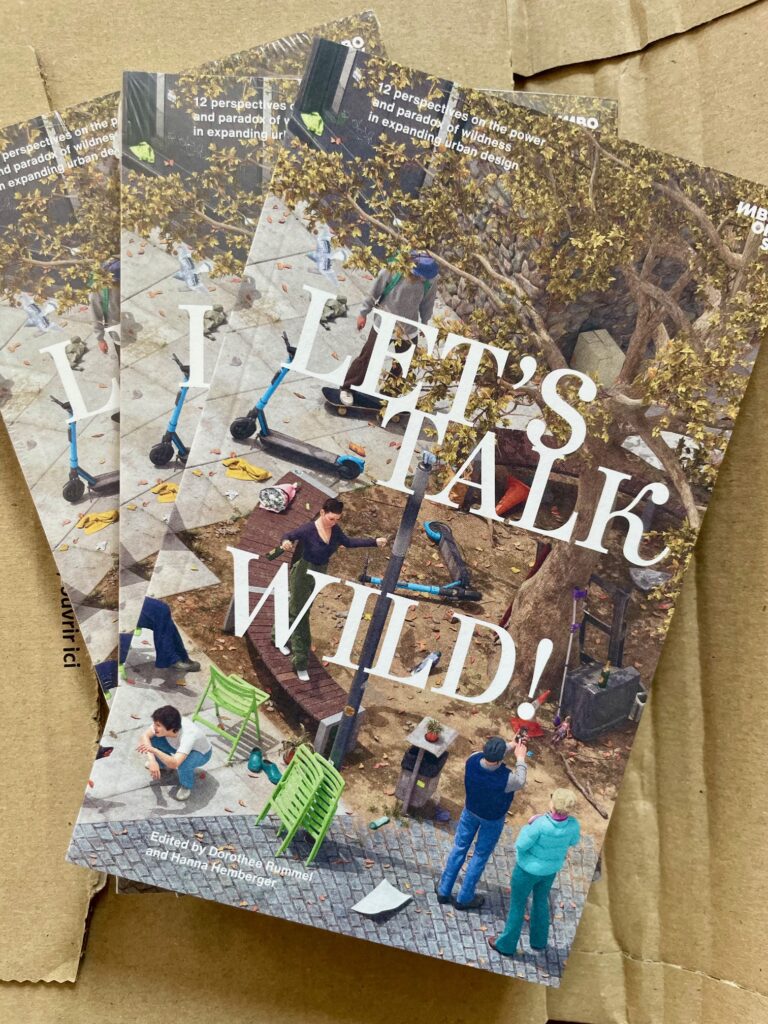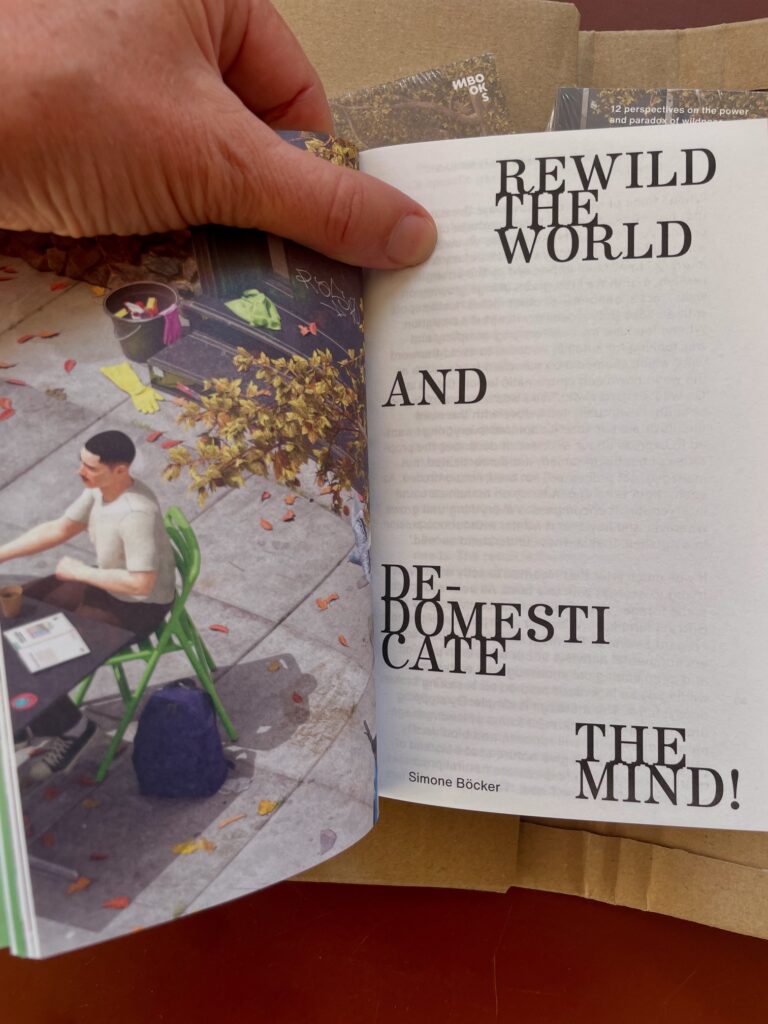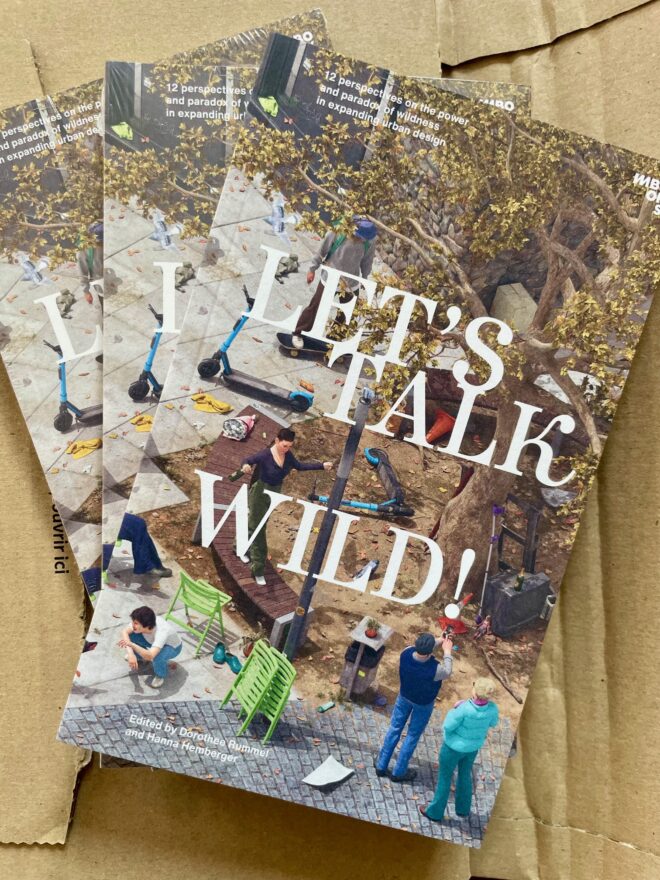

Die Fakultät Architektur und Urbanistik der Bauhaus-Universität Weimar hat im Rahmen des Seminars „Let’s talk wild!“ dieses Büchlein herausgegeben (M BOOKS, Weimar 2025). 12 Perspektiven aus verschiedenen Disziplinen mit ihrem Blick auf Wildnis und urbanes Design. Dies ist mein Beitrag zum Nachlesen mit dem Titel:
Rewild the World and De-Domesticate the Mind!
When I think of wildness, it is always the dandelion that comes to my mind first. This is perhaps unsurprising. As a forager, I have a close connection to wild plants, and since the very start of my foraging journey, I have been impressed by the strength and resilience of these little green beings growing on walls, rocks, concrete, or other rather hostile spots with an ease that evokes my deepest admiration. When I founded my own foraging company and was looking for a name, I wanted to avoid the word ‚wild,‘ which seemed a bit overused to me such as the well-known and emblematic lexical field à la ‚Go wild‘ or ‚Grow wild‘. Wild was simply not saying enough. I eventually fell in love with the word ‚uncultivated‘ because it captured everything I wanted to express about wildness. It describes the properties of not being tamed, not domesticated, not managed, not processed, not bred, not controlled. As such, there is no dependency on human care and intervention. It encompasses everything that grows wherever and however it wants, without compulsion. In a nutshell, that is what I understand as ‚wild.‘
It was much later that I learned exactly what I was trying to express with this term. As both a journalist and a forager, I came across the book Feral by the British journalist and author George Monbiot, who I regard as one of the most inspiring political and environmental activists of our time. With passion and deep ecological knowledge, he writes about rewilding as an ingenious method for restoring broken ecosystems. The message is simple: By stopping unsustainable and harmful forms of land management, ecosystems will recover and biodiversity will return. When we give nature space instead of exerting control, we help restore natural processes and allow nature to self-heal. This approach differs from classic nature conservation because it lacks a specific goal or plan, allowing nature to „decide.“
The result is something rewilders call “self-willed land”: territory that develops according to its own intrinsic directives. Considering this concept of wildness, it is probably no coincidence that the term ‚wild‘ likely derives from the word ‚will‘. So the key question about the wildness of a place is how much self determination all possible agents of a place are allowed to perform. In other words, wildness is a place that is out of human control, or more scientifically, a place where natural processes can unfold without extensive suppression or interference.
Why is it so important to examine questions of wildness? Everywhere on the planet, wildness―and ecological balance in general―is threatened to such a degree that our survival is at risk. We are living in landscapes that barely resemble the abundance and magnificence of previous ecosystems. Land consumption is one of the biggest problems of our time, involving the massive use of land to exploit natural resources for our purposes. Nature has become an object that only serves our desires and needs. The result are the fragmented landscapes we can witness almost everywhere: large patchwork patterns, with small islands of green here and there, framed by roads, buildings, cities, industrial parks, railways, airports, and other man-made infrastructure. The unbridled growth imperative of capitalism, which depends on the ruthless extraction of natural resources, was already severe in the 1980s when the Club of Rome warned of its consequences. Today, 40 years later, the situation is so alarming that doomsday scenarios no longer seem unrealistic. We have lost not only lost parts of our planet’s natural systems but also our place within them. We have lost our connection with ecosystems that have sustained us for millennia. We are lost.
What, then, can be done? We need to re-wild the world! This indeed is the critical question we need to adress: How can we rewild at least a decent part of our overcultivated land? Here my foraging experience comes back into the picture. Let us remember the wonderful word ‚uncultivated‘ and imagine its meaning in this context. In order to restore ecosytems, we have to un-cultivate our landscapes. Uncultivation requires changing land management practices and withdrawing from large areas of land use by abandoning excessive cultivation. This envolves restoring our soils and turning concrete expanses into flourishing green spaces. Furthermore, it means embracing de-growth in order to halt the distructive spiral of economic excess. Nature conservation is not possible in a system that is geared toward growth and thus inevitably relies on exploiting nature. This kind of de-domestication does not aim to revert to a past state but envisons a future that we are dreaming of, one that has never existed before because we are crafting it in this moment.
However, there is probably a step that needs to come before this. If the current climate and biodiversity crises—the large-scale loss of natural systems—are the product of our exploitative lifestyle, our brutal economic system, and our lost way of being in the world, then we need to question the conditions that have led us down this track. This requires taking a closer look at the underlying conditions that determine our actions, our thinking, cultural heritage, and perspectives on nature. This paradigm shift must begin in our minds. As long as nature means little more to us than a supermarket shelf from which we can serve ourselves, something in our relationship with nature is fundamentally broken.
The roots of this problem in Western culture largely lie in the thinking of the Enlightenment era, which declared all non-human beings to be inert matter. Prior to this, Christianity, which placed man at the top of creation, had already led to alienation and separation from the life cycles that humans were naturally a part of. With the advent of capitalism and philosophers like René Descartes and Thomas Hobbes, nature further lost its intrinsic value and became a commodity that humans could freely dispose of. Today, in a fully technological, scientifically oriented, purely rational world, we have lost the understanding of the planet as a living entity with humans as one species among others. Therefore, to rewild ecosystems, we first have to rewild our minds. This entails a paradigm shift, not only in our perspective on nature but in our understanding of our role as humans on this planet. Such a new ontology would reject human supremacy, embracing instead a circle of life that recognizes the value of different life forms. It’s about abandoning an entirely human-centered worldview in favor of a state of interbeing. Only once we recognize that a river, a butterfly, or a tree has the same right to exist as we do, can the needs of all beings be negotiated on an equal footing.
Granting nature subject status is probably the most revolutionary decision that could be made at the moment. Fortunately, a growing movement is fighting for nature rights, making significant progress in countries like Ecuador, Bolivia, and parts of New Zealand. Nonetheless, this is much more than a legal issue. If the question is about recognizing and respecting the needs of non-human beings, we need an open, sensitive heart. Rewilding our hearts involves cultivating compassion and acknowledging the equality of all life forms. It requires understanding and feeling our own vulnerability alongside the vulnerability of the natural world. A great way to get an idea of how different nature connections can be is by learning from indigenous communities all over the world. The emphasis here is on learning how to avoid making short-sighted, profit-driven decisions, and instead, taking future generations and the well-being of human and non-human communities in account. We would learn how important giving is instead of just taking. Practices like the honorable harvest can teach us to respect the limitations of what nature can sustainably provide. Learning to give—in awareness of giving as one of the main principles of life—is probably the most important and most difficult lesson.
It is a great misunderstanding to think of this huge transformation effort as renunciation. While there are areas of our lives, such as mobility, energy, and communication, where we have to make concessions. There are just as many things that can be gained though. Less is more—this simple proverb hits the mark. Maybe we would create a much fairer, more livable world that functions according to principles that consider more than just the well-being of a chosen few and their privileges. What we need is the courage to dream and think up utopias. There are already attempts to measure public wealth in different ways than by only looking at the GDP. The Better Life Index or the Genuine Progress Indicator, for example, focus on social and ecological criteria like living conditions, public health, education, working conditions, or happiness. A lot of people are longing for a connection to nature. An increasing number of people seek outdoor experiences like excursions or hiking trips. Nevertheless, at the same time, our alienation from nature is greater than ever and often reduced to superficial forms of consumption rather than a connection characterized by understanding and reciprocity. Nature is used as a scenery for relaxation, a place to recharge our batteries, a kind of weekend Disneyland space park experience. Maybe that’s an unfair exaggeration, but there is a core of truth in it. We don’t, in most cases, have a real relationship with nature. A true connection would mean connecting with animals, trees, plants, knowing and respecting the non-human residents inhabiting a place.
Even though some people claim that wildness has long since disappeared, especially in our industrialized Western countries, I do not believe this to be quite true. Wildness is a part of our being, and even if we seem to have forgotten how a real connection with nature (and by extension, with ourselves) can look like, it is not too late to re-learn it. It is not too late to rewild our lives! Let’s become guardians of this planet! By embracing a more-than-human perspective and a state of interbeing, we can move beyond merely discussing wildness and begin to embody it. Let’s not only talk wild, let’s become wild!
Das Buch ist erhältlich im Buchhandel oder unter www.m-books.eu

